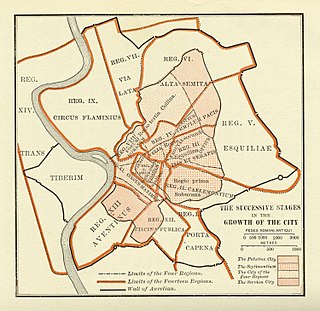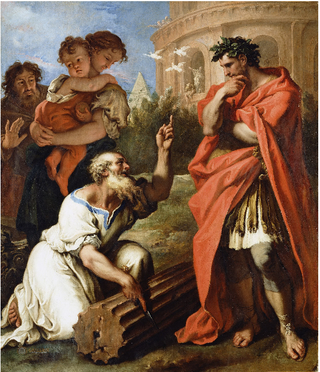Related Research Articles

Lucius Tarquinius Superbus was the legendary seventh and final king of Rome, reigning 25 years until the popular uprising that led to the establishment of the Roman Republic. He is commonly known as Tarquin the Proud, from his cognomen Superbus.

The Roman Kingdom, also referred to as the Roman monarchy or the regal period of ancient Rome, was the earliest period of Roman history when the city and its territory were ruled by kings. According to tradition, the Roman Kingdom began with the city's founding c. 753 BC, with settlements around the Palatine Hill along the river Tiber in central Italy, and ended with the overthrow of the kings and the establishment of the Republic c. 509 BC.
The year 510 BC was a year of the pre-Julian Roman calendar. In the Roman Empire, it was known as year 244 Ab urbe condita. The denomination 510 BC for this year has been used since the early medieval period, when the Anno Domini calendar era became the prevalent method in Europe for naming years.

Lucius Junius Brutus was the semi-legendary founder of the Roman Republic, and traditionally one of its first consuls in 509 BC. He was reputedly responsible for the expulsion of his uncle the Roman king Tarquinius Superbus after the suicide of Lucretia, which led to the overthrow of the Roman monarchy. He was involved in the abdication of fellow consul Tarquinius Collatinus, and executed two of his sons for plotting the restoration of the Tarquins.

The gens Junia or Iunia was one of the most celebrated families of ancient Rome. The gens may originally have been patrician, and was already prominent in the last days of the Roman monarchy. Lucius Junius Brutus was the nephew of Lucius Tarquinius Superbus, the seventh and last king of Rome, and on the expulsion of Tarquin in 509 BC, he became one of the first consuls of the Roman Republic.

Publius Valerius Poplicola or Publicola was one of four Roman aristocrats who led the overthrow of the monarchy, and became a Roman consul, the colleague of Lucius Junius Brutus in 509 BC, traditionally considered the first year of the Roman Republic.
Arruns Tarquinius was one of the sons of Lucius Tarquinius Superbus, the last King of Rome. Ancient sources differ as to whether he was the second or third son. In the earliest accounts, passed through fragments of the first Roman historian, Fabius Pictor, he is the third son. According to Livy and Dionysius of Halicarnassus, he is the second son. Modern historians doubt the historicity of the specific actions attributed to Arruns and other members of his dynasty, regarding them as highly embellished by later accounts.

The gens Tarquinia was a plebeian family at ancient Rome, usually associated with Lucius Tarquinius Priscus and Lucius Tarquinius Superbus, the fifth and seventh Kings of Rome. Most of the Tarquinii who appear in history are connected in some way with this dynasty, but a few appear during the later Republic, and others from inscriptions, some dating as late as the fourth century AD.
Demaratus, frequently called Demaratus of Corinth, was the father of Lucius Tarquinius Priscus, the fifth King of Rome, the grandfather or great-grandfather of Lucius Tarquinius Superbus, the seventh and last Roman king, and an ancestor of Lucius Junius Brutus and Lucius Tarquinius Collatinus, the first consuls of the Roman Republic.

Lucius Tarquinius Ar. f. Ar. n. Collatinus was one of the first two consuls of the Roman Republic in 509 BC, together with Lucius Junius Brutus. The two men had led the revolution which overthrew the Roman monarchy. He was forced to resign his office and go into exile as a result of the hatred he had helped engender in the people against the former ruling house.
Arruns, also spelled Aruns, is an Etruscan praenomen, thought to mean "prince." Various figures in Roman history were known by this name, including:
The Battle of Silva Arsia was a battle in 509 BC between the republican forces of ancient Rome and Etruscan forces of Tarquinii and Veii led by the deposed Roman king Lucius Tarquinius Superbus. It resulted in victory to the nascent Roman Republic.

Spurius Lucretius Tricipitinus is a semi-legendary figure in early Roman history. He was the first Suffect Consul of Rome and was also the father of Lucretia, whose rape by Sextus Tarquinius, followed by her suicide, resulted in the dethronement of King Lucius Tarquinius Superbus, therefore directly precipitating the founding of the Roman Republic. It is believed that Lucretius and his accomplishments are at least partly mythical and most ancient references to him were penned by Livy and Plutarch.
Arruns Tarquinius was the brother of Lucius Tarquinius Superbus, the seventh and last King of Rome.

In Rome's early semi-legendary history, Tarquinia was the daughter of Lucius Tarquinius Priscus, the fifth king of Rome,. Her father, Lucius Tarquinius Priscus, gave her in marriage to Servius Tullius, the sixth king of Rome. She was the mother of Lucius Junius Brutus, who overthrew the monarchy and became one of Rome's first consuls in 509 BC. She had another son, who was put to death by Superbus after he took the Roman rule from Servius.
Titus Tarquinius was one of the sons of the last king of Rome, Lucius Tarquinius Superbus. According to Livy and fragments of the first Roman historian, Fabius Pictor, he was the eldest son; however, Dionysius of Halicarnassus claims he was not.

The Tarquinian conspiracy was a conspiracy amongst a number of senators and leading men of ancient Rome in 509 BC to reinstate the monarchy, and to put Lucius Tarquinius Superbus back on the throne. The conspirators were discovered and executed. The story is part of Rome's early semi-legendary history.

The overthrow of the Roman monarchy was an event in ancient Rome that took place between the 6th and 5th centuries BC where a political revolution replaced the then-existing Roman monarchy under Lucius Tarquinius Superbus with a republic. The details of the event were largely forgotten by the Romans a few centuries later; later Roman historians presented a narrative of the events, traditionally dated to c. 509 BC, but it is largely believed to be fictitious by modern scholars.

Brutus is a tragedy in five acts by Voltaire. He began work on the play in 1727 in England and completed it in 1729. It premiered on 11 December 1730 in Paris.
References
- ↑ Miles, Richard (2010). Carthage Must be Destroyed: The Rise and Fall of an Ancient Mediterranean Civilization. Allen Lane. ISBN 9780713997934.